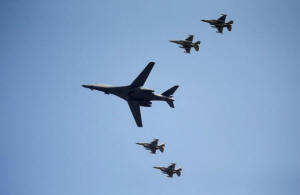|
U.S. bombers fly over South Korea in show
of force after nuclear test
 Send a link to a friend
Send a link to a friend
 [September 13, 2016]
By James Pearson and Ju-min Park [September 13, 2016]
By James Pearson and Ju-min Park
SEOUL (Reuters) - Two U.S. B-1 bombers flew
over South Korea on Tuesday in a show of force and solidarity with its
ally after North Korea's nuclear test last week, while a U.S. envoy
called for a swift and strong response to Pyongyang from the United
Nations.
Speaking in the South Korean capital on Tuesday, Sung Kim, the U.S.
envoy on North Korea, added that the United States remained open to
meaningful dialogue with Pyongyang on ending its pursuit of nuclear
weapons.
"Our intention is to secure the strongest possible (U.N. Security
Council) resolution that includes new sanctions as quickly as possible,"
Kim told a news briefing after meeting his South Korean counterpart.
He said the United States would work with China, North Korea's major
diplomatic ally, to close loopholes in existing resolutions, which were
tightened with Beijing's backing in March.
"China has been very clear that they understand the need for a new U.N.
security council resolution in response to the latest North Korean
nuclear test," Kim said.
However, China and Russia, which strongly oppose a recent decision by
the United States and South Korea to deploy an advanced anti-missile
system in the South to counter the North's missile threat, have shown
reluctance to back further sanctions.

"Both sides think that North Korea's nuclear test is not beneficial to
peace and stability on the Korean peninsula," China's official People's
Daily newspaper said on Tuesday following a high-level China-Russia
security meeting in Beijing.
"At present, we must work hard to prevent the situation on the peninsula
continuing to escalate, and put the issue of the nuclearization of the
peninsula back on the track of dialogue and consultation," it said.
FORCE AND SOLIDARITY
The pair of U.S. supersonic B-1B Lancer strategic bombers took off from
their base in Guam and flew with two Japan Air Self Defense Force
aircraft before a "hand-off" to South Korean fighters, according to the
U.S. military.
The B-1Bs were then escorted by South Korean and U.S. fighter jets in a
low-altitude flight over Osan Air Base, which is 77 km (48 miles) from
the Demilitarised Zone border with the North and about 40 km (25 miles)
from the South's capital Seoul.
"These flights demonstrate the solidarity between South Korea, the
United States, and Japan to defend against North Korea's provocative and
destabilizing actions," said Admiral Harry Harris, commander of the U.S.
Pacific Command.
North Korea's official KCNA news agency said public anger was "exploding
like a volcano" over Washington's dispatch of bombers to South Korea.
"Any sanction, provocation and pressure cannot ruin our status as a
nuclear state and evil political and military provocations will only
result in a flood of reckless nuclear attacks that will bring a final
destruction," KCNA said.

[to top of second column] |

A U.S. Air Force B-1B bomber flies over Osan Air Base in Pyeongtaek,
South Korea, September 13, 2016. REUTERS/Kim Hong-Ji

China urged restraint among all parties. "If there is a vicious cycle of
tensions continuing to rise and mutual provocations, this is not in
anyone's interests," Chinese foreign ministry spokeswoman Hua Chunying
told a daily briefing.
North Korea's weapons enhancements, including the testing of various
types of missiles this year at an unprecedented rate, have alarmed
neighbors South Korea and Japan.
South Korean President Park Geun-hye maintained her tough stance
against the North.
The two Koreas remain technically at war after their 1950-53
conflict ended in a truce, not a peace treaty.
"I want our government and military to stay fully ready to
retaliate, determined to end North Korea's regime once North Korea
fires even one missile nuclear-armed missile toward our territory,"
Park told a cabinet meeting.
A group of lawmakers in South Korea said on Monday the country
should have a nuclear force of its own, either by acquiring weapons
or asking the United States to redeploy tactical nuclear weapons
withdrawn under a 1991 pact for denuclearization of the Korean
peninsula.
Kim, the U.S. envoy, said there was no need to reintroduce nuclear
weapons in South Korea.
North Korea has refused the U.S. demand that it accept
denuclearization as a condition for holding dialogue.
"It's a question of North Korean intentions and commitment. If North
Korea is ready to talk to us sincerely, I think we can work with
that within the six party process," Kim said.

The six party talks aimed at ending the North's nuclear program
involve the United States, Russia, Japan, South Korea, China, and
North Korea but have been stalled since 2008.
South Korea said on Monday the North is ready to conduct an
additional nuclear test at any time after setting off its most
powerful blast to date on Friday.
(Additional reporting by Kim Do-gyun in Osan, Ben Blanchard in
Beijing and Linda Sieg in Tokyo; Writing by Jack Kim and Tony
Munroe; Editing by Lincoln Feast and Raju Gopalakrishnan)
[© 2016 Thomson Reuters. All rights
reserved.]
Copyright 2016 Reuters. All rights reserved. This material may not be published,
broadcast, rewritten or redistributed. |